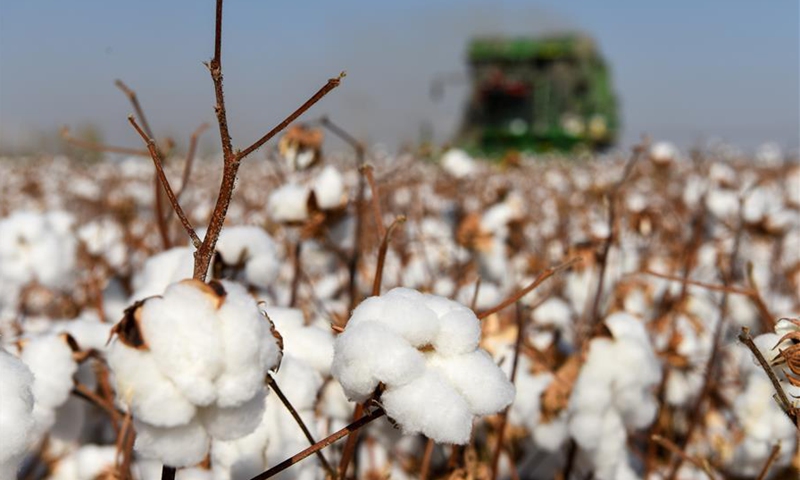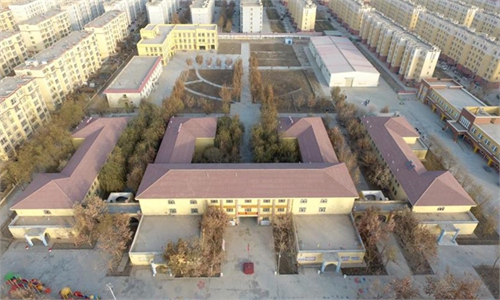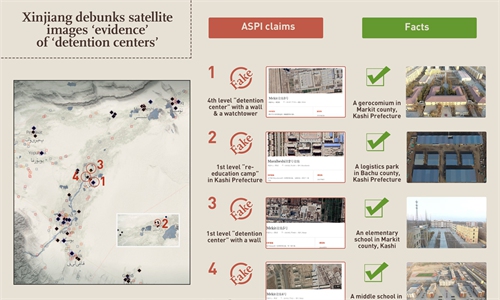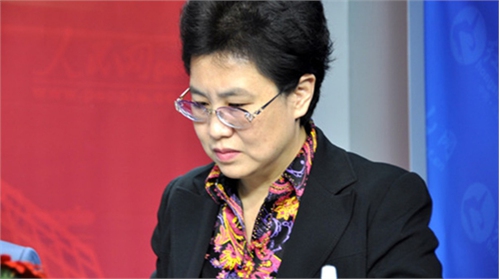
A cotton harvesting machine works in a field in Manas County, Hui Autonomous Prefecture of Changji, northwest China's Xinjiang Uygur Autonomous Region, Oct. 17, 2020. A total of 83 mu (5.53 hectares) of cotton in Manas County entered harvest season in this October. (Xinhua/Ding Lei)
Helping people get a job and "forced labor" are two different concepts. Does the US want to create "forced unemployment" and "forced poverty" in China's Xinjiang Uygur Autonomous Region by cracking down on local enterprises through sanctions?
That's what Chinese Foreign Ministry spokesperson asked in response to the US Customs and Border Protection (CBP)'s detention order on cotton products made by the Xinjiang Production and Construction Corps (XPCC).
The US Department of Homeland Security announced on Wednesday that US CBP personnel at all US ports of entry will detain shipments containing cotton and cotton products originating from the XPCC.
CBP's Office of Trade directed the issuance of a Withhold Release Order (WRO) against cotton products made by the XPCC based on information that indicates the use of forced labor, including convict labor, the department said. The WRO applies to all cotton and cotton products produced by the XPCC and its subordinate and affiliated entities, as well as any product made in whole or in part with or derived from that cotton, such as apparel, garments, and textiles.
Some US politicians cooked up the so-called "forced labor" information to limit and suppress Chinese enterprises to contain China. Such a move violates international trade rules and the market economy, and disrupts the global industrial and supply chains, which will damage the interests of countries, including the US, and their enterprises and consumers. It is a typical behavior of harming others without benefiting itself, Chinese Foreign Ministry Spokesperson Hua Chunying said at Thursday's press briefing.
Hua stressed that helping people of all ethnic groups get a job and "forced labor" are two different concepts. The International Labor Organization's Convention on Forced Labor defines "forced labor" as "forcing any person to perform any labor or service that is not voluntary under the threat of any punishment." Workers of all ethnic groups in Xinjiang choose their jobs according to their own will and sign labor contracts with enterprises in accordance with the law, which stipulates that they will not be discriminated against on grounds of ethnicity, sex or religious belief.
Governments at all levels in Xinjiang respect the willingness of ethnic minorities to seek employment, and provide training for workers who apply for jobs voluntarily to improve their skills, Hua said.
"Some US politicians claim to care about and protect the rights of ethnic minorities in Xinjiang, while suppressing Xinjiang's enterprises with sanctions, thus disrupting the steady development and prosperity of Xinjiang. Doesn't this deprive people of all ethnic groups in Xinjiang of their right to pursue a better life through legitimate work? Is it not to create 'compulsory unemployment' and 'compulsory poverty' in Xinjiang?" Hua asked.
She asked if "some US politicians show unusual 'concern' over China's Xinjiang affairs, but turn a blind eye to the unequal rights of ethnic minorities in the US, such as the high poverty rate, racial discrimination. Why doesn't the US say 'America First' when it comes to protecting the rights of minority groups?"
Global Times



